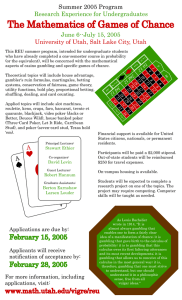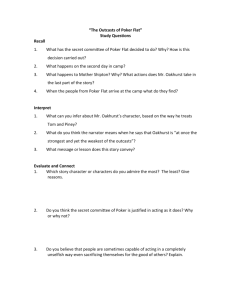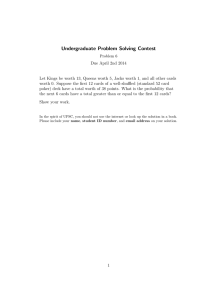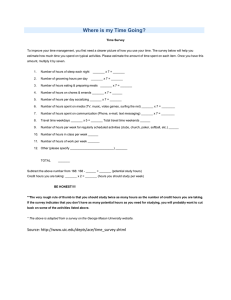one that (i) is a violation of the law
advertisement
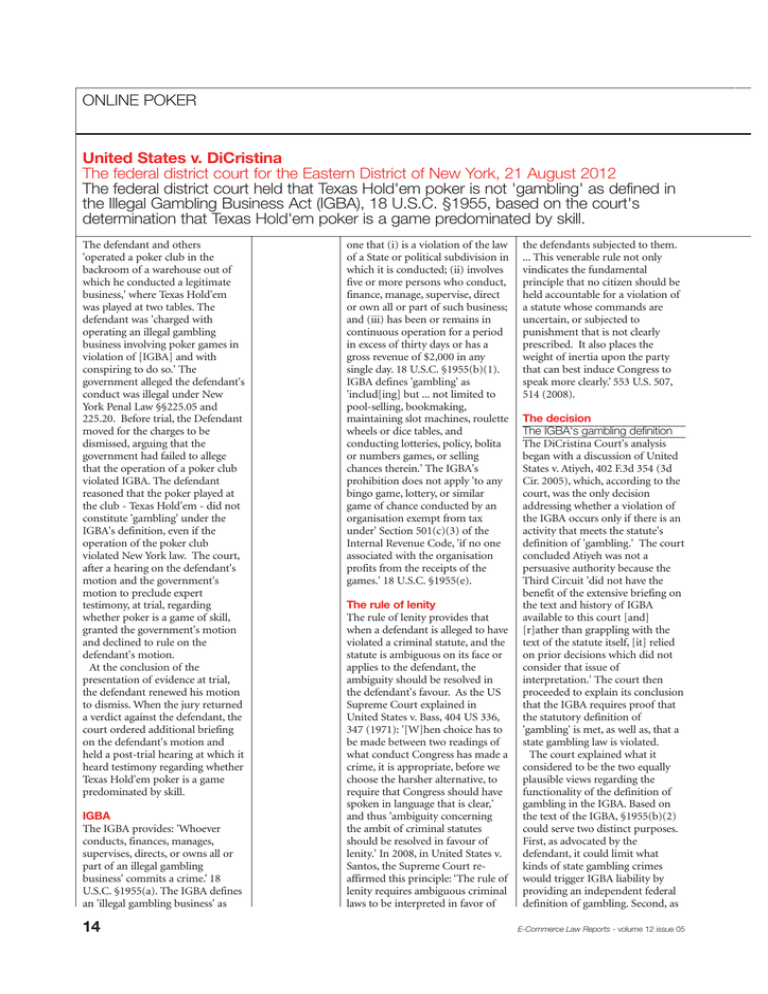
ONLINE POKER United States v. DiCristina The federal district court for the Eastern District of New York, 21 August 2012 The federal district court held that Texas Hold'em poker is not 'gambling' as defined in the Illegal Gambling Business Act (IGBA), 18 U.S.C. §1955, based on the court's determination that Texas Hold'em poker is a game predominated by skill. The defendant and others 'operated a poker club in the backroom of a warehouse out of which he conducted a legitimate business,' where Texas Hold'em was played at two tables. The defendant was 'charged with operating an illegal gambling business involving poker games in violation of [IGBA] and with conspiring to do so.' The government alleged the defendant's conduct was illegal under New York Penal Law §§225.05 and 225.20. Before trial, the Defendant moved for the charges to be dismissed, arguing that the government had failed to allege that the operation of a poker club violated IGBA. The defendant reasoned that the poker played at the club - Texas Hold'em - did not constitute 'gambling' under the IGBA's definition, even if the operation of the poker club violated New York law. The court, after a hearing on the defendant's motion and the government's motion to preclude expert testimony, at trial, regarding whether poker is a game of skill, granted the government's motion and declined to rule on the defendant's motion. At the conclusion of the presentation of evidence at trial, the defendant renewed his motion to dismiss. When the jury returned a verdict against the defendant, the court ordered additional briefing on the defendant's motion and held a post-trial hearing at which it heard testimony regarding whether Texas Hold'em poker is a game predominated by skill. IGBA The IGBA provides: 'Whoever conducts, finances, manages, supervises, directs, or owns all or part of an illegal gambling business' commits a crime.’ 18 U.S.C. §1955(a). The IGBA defines an 'illegal gambling business' as 14 one that (i) is a violation of the law of a State or political subdivision in which it is conducted; (ii) involves five or more persons who conduct, finance, manage, supervise, direct or own all or part of such business; and (iii) has been or remains in continuous operation for a period in excess of thirty days or has a gross revenue of $2,000 in any single day. 18 U.S.C. §1955(b)(1). IGBA defines 'gambling' as 'includ[ing] but ... not limited to pool-selling, bookmaking, maintaining slot machines, roulette wheels or dice tables, and conducting lotteries, policy, bolita or numbers games, or selling chances therein.' The IGBA's prohibition does not apply 'to any bingo game, lottery, or similar game of chance conducted by an organisation exempt from tax under' Section 501(c)(3) of the Internal Revenue Code, 'if no one associated with the organisation profits from the receipts of the games.' 18 U.S.C. §1955(e). The rule of lenity The rule of lenity provides that when a defendant is alleged to have violated a criminal statute, and the statute is ambiguous on its face or applies to the defendant, the ambiguity should be resolved in the defendant's favour. As the US Supreme Court explained in United States v. Bass, 404 US 336, 347 (1971): '[W]hen choice has to be made between two readings of what conduct Congress has made a crime, it is appropriate, before we choose the harsher alternative, to require that Congress should have spoken in language that is clear,' and thus 'ambiguity concerning the ambit of criminal statutes should be resolved in favour of lenity.' In 2008, in United States v. Santos, the Supreme Court reaffirmed this principle: ‘The rule of lenity requires ambiguous criminal laws to be interpreted in favor of the defendants subjected to them. ... This venerable rule not only vindicates the fundamental principle that no citizen should be held accountable for a violation of a statute whose commands are uncertain, or subjected to punishment that is not clearly prescribed. It also places the weight of inertia upon the party that can best induce Congress to speak more clearly.’ 553 U.S. 507, 514 (2008). The decision The IGBA's gambling definition The DiCristina Court's analysis began with a discussion of United States v. Atiyeh, 402 F.3d 354 (3d Cir. 2005), which, according to the court, was the only decision addressing whether a violation of the IGBA occurs only if there is an activity that meets the statute's definition of 'gambling.' The court concluded Atiyeh was not a persuasive authority because the Third Circuit 'did not have the benefit of the extensive briefing on the text and history of IGBA available to this court [and] [r]ather than grappling with the text of the statute itself, [it] relied on prior decisions which did not consider that issue of interpretation.' The court then proceeded to explain its conclusion that the IGBA requires proof that the statutory definition of 'gambling' is met, as well as, that a state gambling law is violated. The court explained what it considered to be the two equally plausible views regarding the functionality of the definition of gambling in the IGBA. Based on the text of the IGBA, §1955(b)(2) could serve two distinct purposes. First, as advocated by the defendant, it could limit what kinds of state gambling crimes would trigger IGBA liability by providing an independent federal definition of gambling. Second, as E-Commerce Law Reports - volume 12 issue 05 ONLINE POKER advocated by the government, it could indicate what categories of state laws are gambling laws - i.e., laws that criminalise ‘pool-selling, bookmaking, maintaining slot machines, roulette wheels or dice tables, and conducting lotteries, policy, bolita or numbers games, or selling chances therein’ or similar activities forbidden by state law. Both readings are plausible. Neither would violate the ‘cardinal principle of statutory construction’ that ‘a statute ought, upon the whole, to be so construed that, if it can be prevented, no clause, sentence, or word shall be superfluous, void, or insignificant.' The court went on to review the legislative history, but concluded it did 'not settle the dispute' between the two plausible interpretations. Having determined the purpose of the IGBA's definition of gambling was unclear, the court applied the rule of lenity and adopted the narrower position, i.e., that to violate the IGBA, it must be shown that the statute's definition of gambling is met, along with that a state gambling law is violated. What constitues 'gambling'? The court pointed out that the 'IGBA does not provide explicit criteria for what constitutes gambling,' which, therefore, required the court to glean the criteria 'by determining what common characteristics unify the games listed in [IGBA's definition] into a cohesive group.' It set out the contentions of the parties, describing the defendant's position as being 'that all the enumerated games are 'house-banked' and that chance predominates over the skill of the players in determining the outcome,' and the government's position as being that 'any game in which something of value is wagered on a future event constitutes gambling.' The court determined the E-Commerce Law Reports - volume 12 issue 05 relevant text and legislative history were ambiguous. It then turned to the parties' contentions. It rejected the defendant's argument that the IGBA's definition of gambling requires the games to be 'housebanked,' because it found nothing in the text, legislative history, other federal statutes, or other evidence to suggest 'that Congress considered whether a game was house-banked [as] a relevant characteristic in determining whether it constituted gambling under the IGBA.' With respect to the government's contention that, because skill is involved in some of the forms of gambling listed in the statute's definition of gambling, 'chance is not the relevant criterion limiting the IGBA's definition of gambling,' the court, while acknowledging that bookmaking and other card games involve skill, explained that poker involves greater skill: 'While a gambler with an encyclopedic knowledge of sports may perform better than others when wagering on the outcome of sporting events, unlike in poker, his skill does not influence game play.' The court concluded the standard proposed by the defendant, an activity predominated by chance, and the one proposed by the government, any activity in which something of value is risked on a future outcome, were equally plausible and, applying the rule of lenity, concluded that 'the tie must go to the defendant.' The court summarised: 'In order to constitute an illegal gambling business under the IGBA, as at common law, the business must operate a game that is predominantly a game of chance.' Is poker predominated by skill? The district court reiterated that it is the government's burden to show 'it is more probable than not that poker is predominated by chance [and] [i]t has failed to do so.' The court distinguished the skill used by players in poker games from that used by participants in games listed in the IGBA's gambling definition, reiterating that '[t]he ability of players to influence game play distinguishes poker from other games, such as sports betting, enumerated in the IGBA.' The court formulated the 'fundamental question' as being 'not whether some chance or skill is involved in poker, but what element predominates.' The court then reviewed the experts' testimony, noting that the defendant's expert 'presented persuasive evidence proving that skill predominates over chance in poker' and that the government's expert did 'not submit[] any contrary analysis, nor any studies which support the conclusion that chance predominates over skill in poker.' Of interest are the four points made by the defendant's expert that the district court found persuasive: (1) [P]oker involves a large number of complex decisions, which allow players of varying skill to differentiate themselves; (2) many people play poker for a living and consistently win money; (3) players who obtain superior results with other starting hands tend to obtain superior results with any given hand, indicating that the players' abilities are responsible for the results; (4) the published studies are all consistent with [the] conclusions. The district court concluded that the defendant's expert had rebutted the government expert's four objections: ! While the differences between skilled and unskilled players can be duplicated by random, unskilled play, 'the most skilled poker players continue to perform well, and the least skilled players continue to perform poorly, prospectively, 15 ONLINE POKER [which] could not be said of players in a game of pure chance, indicating that the persistence of success (or failure) in poker is the result of relative skill.' ! The fact that from a singlehand reference, chance may be determinative regardless of player skill is not dispositive because '[e]ven in games of skill such as golf or bridge, ... chance may play a determinative role in the outcome of a single hole or hand[, but] across a series of games - in numbers that would be expected to be played in a local poker establishment - the influence of skill becomes obvious and overwhelming.' ! The claim that the average poker player would not play sufficient hands for skill to predominate, made by the nonpoker playing government expert, was rebutted by the poker-playing defendant's expert who concluded that highly skilled players 'predominate' in a few hands and serious amateur players 'can easily play thousands of hands a month.' ! The fact that 'all but the most skilled participants break even or lose money at poker' and that poker is played for money does not make poker a game predominated by chance and is not even relevant because '[t]he fact that many players lose does not affect the quantity of skill demanded by a particular game.' Analogising to bridge, the court said: '[T]he champions who can consistently demonstrate that skill underlies success in the game are few.' The court concluded the government had failed to meet its burden of showing that chance predominated over skill. This conclusion, however, was not one of law, contrary to the conclusions that (1) one of the elements of the IGBA crime is that the activity at issue constitutes 'gambling' under the statute's definition of that term 16 and (2) a game must be predominated by chance in order to meet the statutory definition. Conclusion On 19 September 2012, the government appealed the DiCristina decision to the Second Circuit. The issues raised on appeal will not be revealed until it files its opening brief, due by 15 December 2012. The impacts of DiCristina are likely to be influenced by what the Second Circuit does in deciding the appeal. The district court's decision is thorough and may well have persuasive value in cases brought under the IGBA or a statute that is implicated by an IGBA violation, especially if a case involves an activity similar to Texas Hold'em and is arguably predominated by skill. It also may have value in a state criminal case involving the question of whether Texas Hold'em violates state gambling laws, where the state definition of gambling requires that chance predominate and there is an absence of binding state precedent on the issue. Generally, however, the scope of the decision's precedential value is limited. It pertains only to the IGBA, and, unless affirmed by the Second Circuit, its principles will not be binding as precedent. If the Second Circuit affirms using similar reasoning, its decision would be binding as precedent on the federal district courts within its geographic territory. It is unlikely that the US Supreme Court would grant certiorari to review the Second Circuit's decision. The Supreme Court typically likes to wait for differences among the various circuits on a given issue before weighing in on the issue. From a purely poker perspective, the future value of the DiCristina decision may be limited. The door is not closed on proving poker is predominated by chance in the context of an IGBA prosecution. As the district court pointed out, the government's expert chose not to offer any studies that showed a predominance of chance but, instead, tried to poke holes in the study conducted by the defendant's expert. The next battle of experts might end in a different result. From a practical standpoint, this decision may have blunted an arrow in the quiver of federal prosecutors in connection with prosecuting what they consider to be an illegal gambling business involving poker, including online poker. However, as the district court pointed out, the defendant could have been prosecuted under state law and other federal statutes that, potentially, could have been charged in connection with a violation of state gambling law. Speculation is being expressed that, because of the DiCristina decision, US prosecutors will stop using the IGBA to combat online poker. This speculation is premature because online poker may well be treated differently. The skill of bluffing, as described by the defendant's expert, which the district court found compelling, may not be the same or as predominant when poker is played online. See e.g. Martha Frankel, Hats and Eyeglasses (a memoir about the author's poker playing that includes discussion of her inability to use bluffing skill when playing online). Linda J. Shorey Partner Anthony R. Holtzman Associate K&L Gates Linda.Shorey@klgates.com Anthony.Holtzman@klgates.com This article is a summary of the authors' white paper that contains an in-depth look at the decision. 'When is Gambling Not Gambling? An Examination of United States v. DiCristina,' is available at http://www.klgates.com/resources/xpuP enList.aspx?AdvancedServices=17ddfeaf -0933-4d36-9454-b4fbc3ea10d4&xpST =PubResults. E-Commerce Law Reports - volume 12 issue 05
